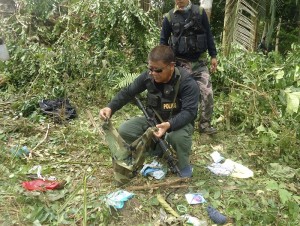
In this Thursday, Feb. 2, 2012, photo, Philippine National Police Special Action Forces examine the site on the island province of Jolo in southern Philippines where three most wanted leaders of the al-Qaida-linked terrorist groups Abu Sayyaf and Jemaah Islamiyah were among those allegedly killed in a US-backed airstrike at dawn in one of the most significant successes against terrorism in Southeast Asia in recent years. The military said, the three killed terrorist leaders are Filipino Abu Sayyaf leader Umbra Jumdail, Malaysian Zulkifli bin Hir and a Singaporean leader in Jemaah Islamiyah Abdullah Ali. AP PHOTO
MANILA, Philippines—A key Abu Sayyaf commander killed in a US-backed airstrike in the southern Philippines was planning terror attacks, including new kidnappings of foreigners and bombings, when he was slain, security officials said Sunday.
The pre-dawn military bombing offensive on Thursday killed longtime Abu Sayyaf commander Umbra Jumdail and several other militants while they slept in huts and hammocks in a jungle hideout on southern Jolo island, officials said.
Military spokesman Colonel Arnulfo Marcelo Burgos said Jumdail’s death was a major blow to his al-Qaida-linked group because he harbored several Southeast Asian terrorist figures, who have provided funds and bomb-making trainings. He had a larger civilian following compared with more brutal Abu Sayyaf commanders which helped him evade military offensives.
“He had the charisma and was the real link used by foreign militants,” Burgos said. “He was a big loss.”
Jumdail’s group was planning some kind of terrorist attacks when he was killed, Burgos said, adding intelligence indicated that six Malaysian militants traveled to Sulu in December and joined his group for unspecified reasons.
Two security officials said future plots by Jumdail’s group included kidnappings of foreigners and bombings.
A few villagers, who were secretly working for the military, traveled to Jumdail’s hideout and pretended to seek medical treatment to be able to bring in and leave some kind of sensor, which was later used by the bomber planes to zero in on the Abu Sayyaf lair, one of the officials said.
Jumdail, who was also known as Dr. Abu Pula, had knowledge of medicine and has drawn support from poor villagers and loyalty of his men partly by treating ordinary illnesses and performing surgeries on wounded combatants, the official said.
The two officials spoke on condition of anonymity because they were not authorized to talk to reporters.
Philippine security officials have given different accounts on whether top Southeast Asian terror suspect Zulkifli bin Hir from Malaysia and Singaporean militant Abdullah Ali were also slain in the intelligence-driven offensive. Not a single body was retrieved by police in the bombed hilly jungle lair near Lanao Dakulah village, fueling different versions of who was killed.
Regional military commander Major General Noel Coballes said Thursday that bin Hir, who used the guerrilla name Marwan, and Ali, also known as Muawiyah, were killed along with Jumdail and 12 other gunmen when their encampment was bombarded by two OV10 planes with 500-pound (227-kilogram) bombs at 3 a.m.
Two Philippine security officials with knowledge of the operation, however, told The Associated Press that new intelligence showed Jumdail, along with his son and seven other militants, was killed but Marwan and Muawiyah were not in the vicinity. The bombs destroyed huts, toppled trees and dug shallow craters in the gently sloping hills.
If Marwan’s death is confirmed, it would mark a major success in further disrupting the already-weakened Jemaah Islamiyah terror network, which has been blamed for some of the most spectacular bombing attacks in Southeast Asia, including the 2002 bombings that killed 202 people in the Indonesian resort of Bali.
But if the initial report proves incorrect, it would turn a largely successful strike into a partial embarrassment for the Philippine military, while burnishing the reputation of the elusive terrorist.
The US has offered a $5 million reward for the capture of Marwan, a US-educated engineer accused of involvement in deadly bombings in the Philippines, organizing terror trainings and plotting attacks.
Malaysia has sent a police team to the Philippines to help determine through DNA tests if some of the human flesh found at the bombed militant lair were his, Burgos said.

